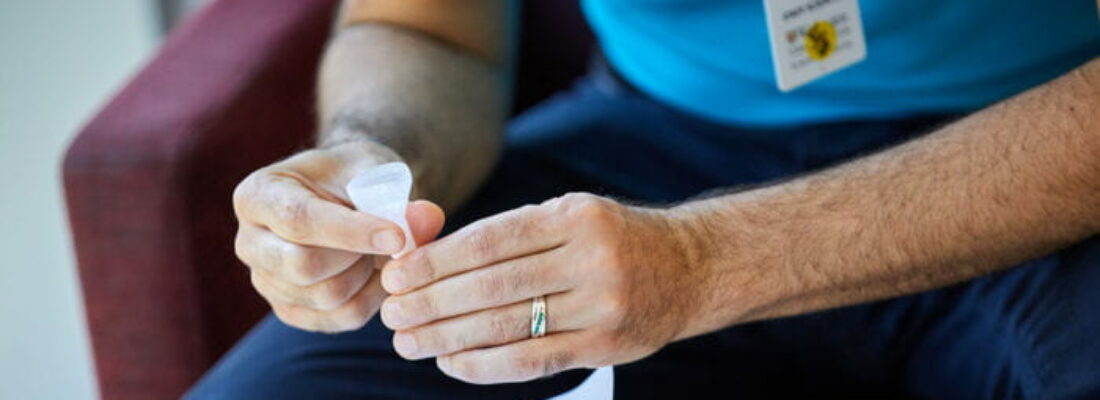Translational Science Benefits
Summary
Developing a COVID-19 diagnostic test that was simple, rapid, accurate, and economical was critically important in controlling the spread of COVID-19.1 Many COVID-19 diagnostic tests require materials such as swabs and personal protective equipment that were in short supply at the start of the pandemic.2,3 Some needed to be collected by a trained professional, which exposed workers to the virus.3
Early in the pandemic, an interdisciplinary team at Washington University in St. Louis and Fluidigm Corporation (now Standard BioTools Inc.) came together to develop and deploy the Advanta Dx SARS-CoV-2 RT-PCR Assay, a saliva-based test for SARS-CoV-2.1 The development was the result of a collaborative initiative between the Department of Genetics, the McDonnell Genome Institute, and Fluidigm that resulted in a highly-sensitive pairing of a saliva sample processing protocol with a particular RT-PCR assay. In the test, the user can collect the sample themselves by spitting into a collection tube.1 Saliva tests are more scalable and less invasive than other COVID-19 diagnostic tests, and the sample is easy to collect. Self-collected saliva tests have also been shown to perform as well as or better than health care worker-collected nasopharyngeal swabs and self-collected anterior nasal swabs.4
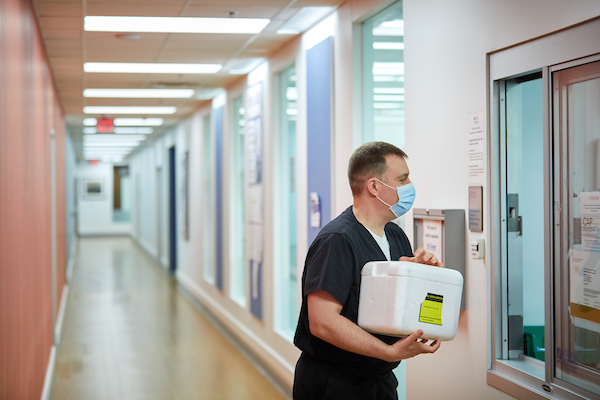
The Washington University team included researchers from the Departments of Genetics, Medicine, Emergency Medicine and Pathology & Immunology; the McDonnell Genome Institute; the Institute for Informatics; the Faculty Practice Plan; and Student/Employee Health who coordinated the test verification process – a huge effort that relied on collecting samples from employee volunteers. The team demonstrated 100% agreement between results from the Advanta Dx SARS-CoV-2 RT-PCR Assay and nasopharyngeal swabs.3 With validation data generated by Washington University, Fluidigm submitted a manufacturers emergency authorization request and was granted emergency use authorization by the FDA for the Advanta Dx SARS-CoV-2 RT-PCR Assay in August 2020.5 The test was then deployed in an accredited and certified environment (CAP/CLIA) through a partnership between Pathology & Immunology and the McDonnell Genome Institute. The accuracy and sensitivity of the test was very high and consistently passed the College of American Pathologists (CAP) proficiency testing. A team from the Institute for Informatics developed software and a reporting engine, and worked with teams in student and employee health to ensure the infrastructure was there to provide results to thousands of students returning to campus.6
Significance
By collecting saliva instead of nasopharyngeal swabs, the Washington University test reduced the potential exposure of healthcare workers to the virus and removed the need for swabs.1,2 The test was also optimized to run on an existing platform and does not require RNA extraction.2,7 Skipping the RNA extraction saved time and money as well as addressed limited reagent supply.2
The development of the test was also critical in allowing students to safely return to in-person learning. The initial rollout to the Washington University in St. Louis community helped ensure that students, faculty and staff could return to campus for the Fall 2020 semester. This test has also been used at other universities including Maryville University, University of Pennsylvania and George Mason University.6,8,9
The saliva test was offered to students, teachers and staff in the Special School District of St. Louis County and the Kennedy Krieger Institute in Baltimore, helping to ensure that children with disabilities can return to in-person schools while also protecting students, teachers and staff.10,11 The saliva test was also used in a partnership between Washington University and 5 school districts in predominantly African American communities to promote a safe return to school.12
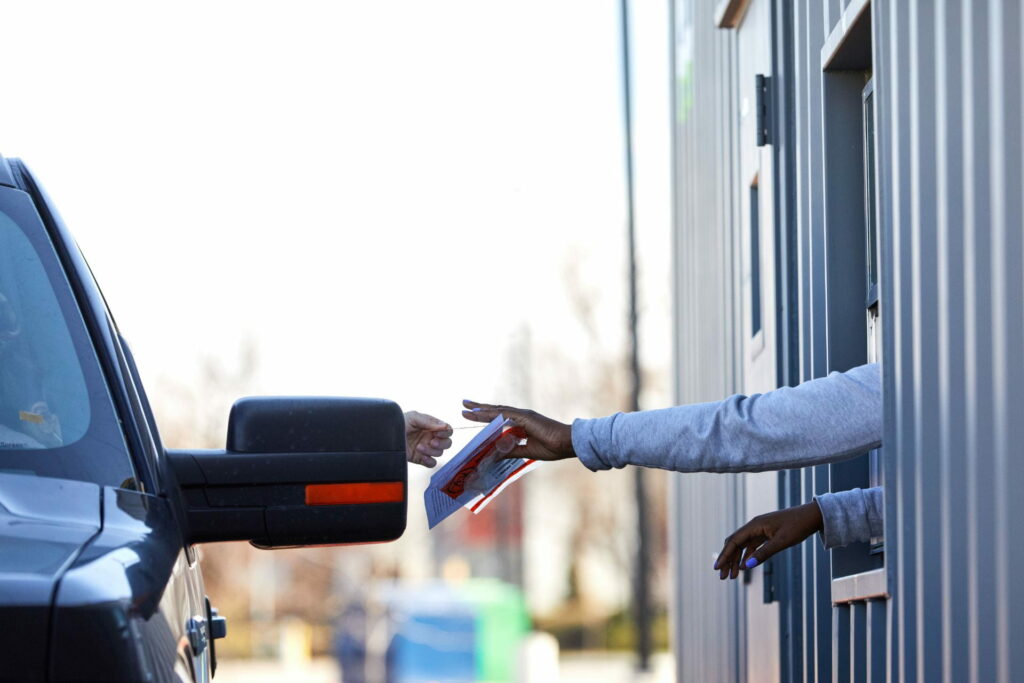
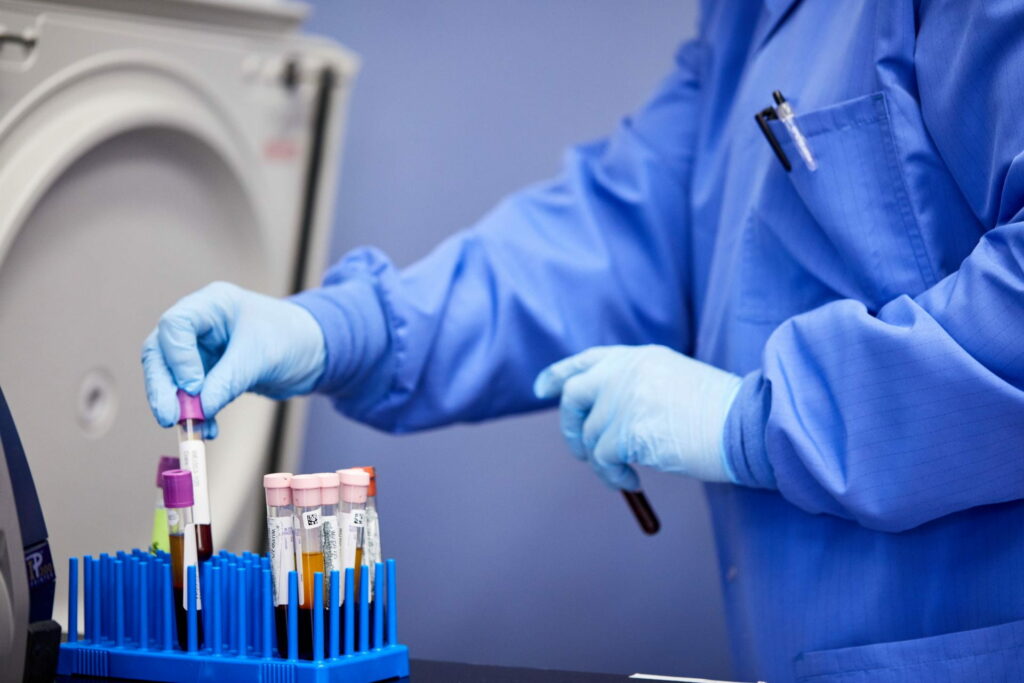
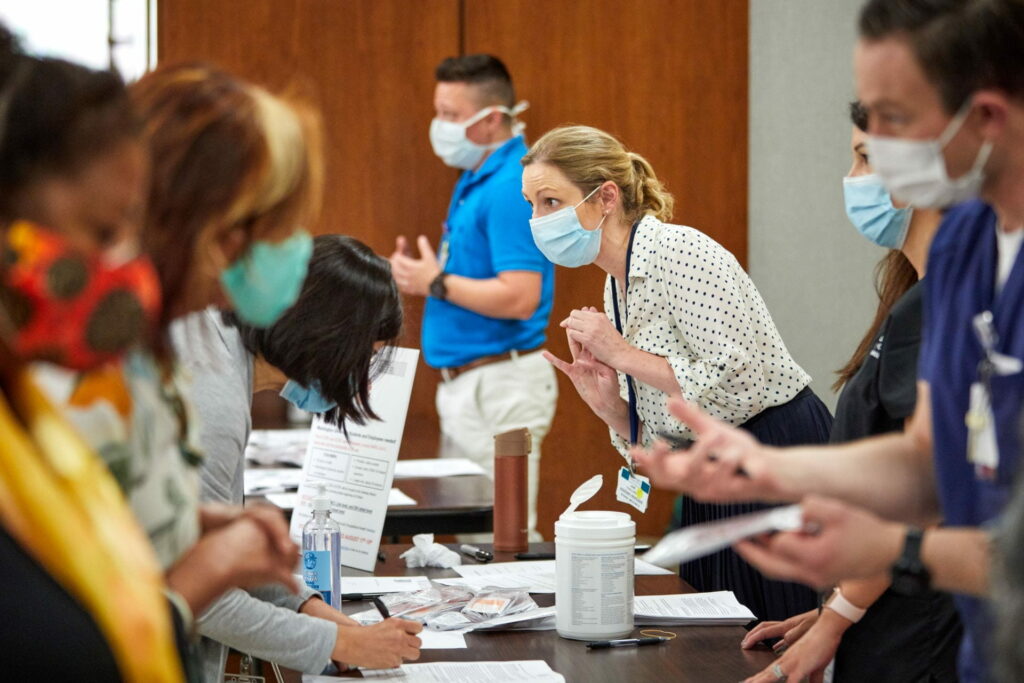
Benefits
Demonstrated benefits are those that have been observed and are verifiable.
Potential benefits are those logically expected with moderate to high confidence.
Developed a saliva test to detect SARS-CoV-2, the virus that causes COVID-19. demonstrated.
Clinical
Created a software infrastructure to deliver test results and that can be integrated into other IT systems.6 demonstrated.
Clinical
Increased diagnostic COVID-19 testing for students, teachers, and staff at the Special School District in St. Louis city.10,11 demonstrated.
Community
Distributed saliva tests to students, teachers, and staff at multiple school districts, as well as at various universities.6,8–12 demonstrated.
Community
The saliva test increased testing capacity, which enhanced contact tracing and surveillance of COVID-19. demonstrated.
Community
The saliva test enables rapid, easy testing on a large-scale, which could reduce disease spread and prevent new cases. potential.
Community
Collaboration with the school stakeholders will lead to tailored messaging strategies to maximize testing of children and staff.11 potential.
Community
Rapid, widespread testing of large populations allows people to return to work, school, and their daily activities safely, which could improve quality of life. potential.
Community
Reduced testing costs by decreasing reliance on more expensive testing methods and scarce testing supplies.13 demonstrated.
Economic
Fluidgim received the CE-IVD mark in January 2021, in conformance with the European Union In Vitro Diagnostic Directive, enabling distribution of the test in Europe.15 demonstrated.
Economic
The Central Drugs Standard Control Organization (CDSCO) granted a license to Premas Life Sciences for use of the test in India.14 demonstrated.
Economic
The FDA approved emergency use of the Advanta Dx SARS-CoV-2 RT-PCR Assay test on August 25, 2020.5 demonstrated.
Economic
A provisional patent has been filed by Washington University researchers.16 potential.
Economic
This research has clinical, community, and economic implications. The framework for these implications was derived from the Translational Science Benefits Model created by the Institute of Clinical & Translational Sciences at Washington University in St. Louis.17
Clinical
An interdisciplinary team at Washington University in St. Louis and Fluidigm Corporation developed the Advanta Dx SARS-CoV-2 RT-PCR Assay, a saliva-based diagnostic test for SARS CoV-2. A team from the Institute for Informatics combined off-the-shelf and custom software to create a data engine that reports test results and integrates into other systems.6 By the end of 2020, over 50,000 samples have been processed with the software.6
Community
The Advanta Dx SARS-CoV-2 RT-PCR Assay is more scalable than other SARS CoV-2 tests, as it does not require RNA extraction or trained professionals to collect samples.2 Since the saliva sample can be collected independently, a trained professional is not needed to collect samples which eliminates this exposure to the virus. The Advanta Dx SARS-CoV-2 RT-PCR Assay also increased health care accessibility in the St. Louis region and at other universities. The test was rolled-out to the students, staff and teachers in a Special School District to track transmission rates and enable a vulnerable student population to safely return to in-person schooling.10 The test was also rolled-out at multiple universities, allowing students and staff to return to campuses safely. Diagnostic testing for COVID-19 on a large scale allows for better surveillance of the disease and could therefore reduce the spread of the disease. Widespread, rapid, and accessible testing is essential for people to return to work, school, and their daily lives.
Economic
The Washington University research team filed for a provisional patent filing and license agreements for use of the test in the US, India and Europe.5,14,15,16 Saliva testing is also more economic than other SARS CoV-2 tests, such as nasopharyngeal swabs, because saliva testing does not require trained professionals to collect samples, personal protective equipment, or swabs.13
Funding: WUSM COVID Research fund, Department of Genetics and McDonnell Genome Institute, P30 CA91842, UL1 TR002345; The Fluidigm RADx project is supported by the NIH Rapid Acceleration of Diagnostics initiative and has been funded in whole or in part with federal funds from the National Institute of Biomedical Imaging and Bioengineering, National Institutes of Health, Department of Health and Human Services, under contract No. 75N92020C00009; National Institutes of Health (NIH), grant numbers P50HD103525 and P50HD103525S1.
- Innovation: COVID-19 Testing | McDonnell Genome Institute (MGI) | Washington University in St. Louis. Accessed May 9, 2022.
- Strait JE. Washington University develops COVID-19 saliva test – Washington University School of Medicine in St. Louis. Accessed May 9, 2022.
- Lynch M. Advanta Dx SARS-CoV-2 RT-PCR Assay – For High-Throughput COVID-19 Diagnostic Testing with Saliva for Use with FDA Emergency Use Authorization (EUA). Presented at: February 11, 2021.
- Hanson KE, Barker AP, Hillyard DR, et al. Self-Collect Anterior Nasal and Saliva Specimens versus Health Care Worker-Collected Nasopharyngeal Swabs for the Molecular Detection of SARS-CoV-2. Journal of Clinical Microbiology. 2020;58(11):5
- United States Food and Drug Administration. Advanta Dx SARS-CoV-2 RT-PCR Assay – EUA201725. Published online February 26, 2021. Accessed May 22, 2022.
- Building the Data Engine that Makes the University’s COVID-19 Saliva Testing Go. Institute for Informatics (I2).
- Fluidigm. Advanta Dx SARS-CoV-2 RT-PCR Assay.; :64. Accessed May 9, 2022.
- Fluidigm to Offer Millions of Advanta COVID-19 Tests at Low Cost to U.S. Colleges and Universities. Fluidigm Corporation. Published October 8, 2020. Accessed June 2, 2022.
- George Mason University Providing COVID-19 Testing with Saliva-Based Advanta Dx SARS-CoV-2 RT-PCR Assay on Biomark HD Platform. Fluidigm Corporation. Published February 10, 2021. Accessed June 2, 2022.
- Sherby MR, Walsh TJ, Lai AM, et al. SARS-CoV-2 Screening Testing in Schools for Children with Intellectual and Developmental Disabilities. J Neurodevelop Disord. 2021;13(1):31. doi:10.1186/s11689-021-09376-z
- Sherby MR, Kalb LG, Coller RJ, DeMuri GP, Butteris S, Foxe JJ, Zand MS, Freedman EG, Dewhurst S, Newland JG, Gurnett CA. Supporting COVID-19 school safety for children with disabilities and medical complexity. Pediatrics. 2022;149(12 Suppl 2):e2021054268H. doi: 10.1542/peds.2021-054268H
- Haroz EE, Kalb LG, Newland JG, et al. Implementation of School-Based COVID-19 Testing Programs in Underserved Populations. Pediatrics. 2022; 149(12 Suppl 2):e2021054268G. doi: 10.1542/peds.2021-054268G
- Bastos ML, Perlman-Arrow S, Menzies D, Campbell JR. The Sensitivity and Costs of Testing for SARS-CoV-2 Infection With Saliva Versus Nasopharyngeal Swabs: A Systematic Review and Meta-analysis. Ann Intern Med. 2021;174(4):501-510. doi:10.7326/M20-6569
- Key Regulatory Body in India Grants Commercial License for Fluidigm Saliva-Based Advanta Dx SARS-CoV-2 RT-PCR Assay. Fluidigm Corporation. Published November 24, 2020. Accessed June 2, 2022.
- Fluidigm Receives CE-IVD Mark for Its Saliva-Based Advanta Dx SARS-CoV-2 RT-PCR Assay for COVID-19. Fluidigm Corporation. Published January 21, 2021. Accessed June 2, 2022.
- Lalli MA, Langmade JS, Chen X, et al. Rapid and Extraction-Free Detection of SARS-CoV-2 from Saliva by Colorimetric Reverse-Transcription Loop-Mediated Isothermal Amplification. Clin Chem. 2021;67(2): 415–424. doi: 10.1093/clinchem/hvaa267
- Institute of Clinical & Translational Sciences at Washington University in St. Louis. Translational Science Benefits Model website. Published February 1, 2019. Accessed October 21, 2020.

